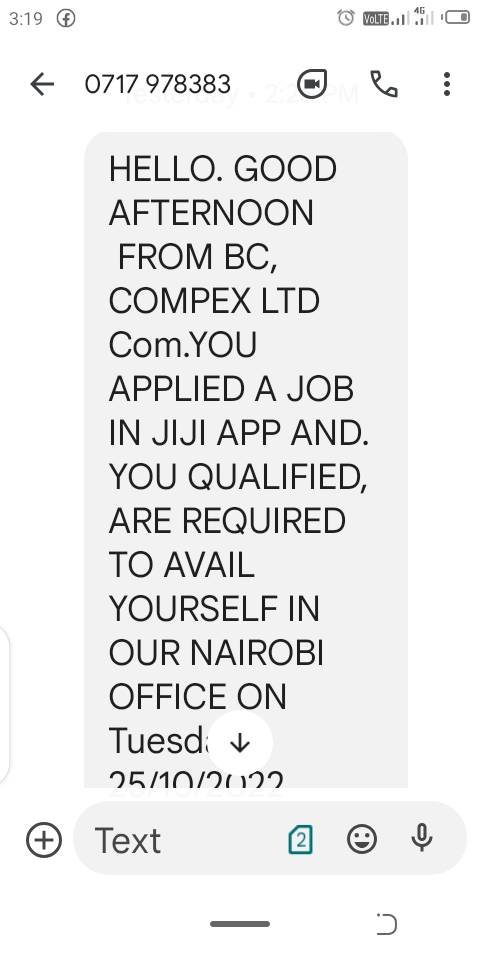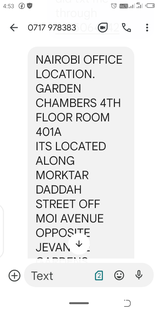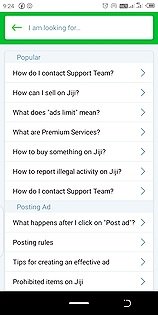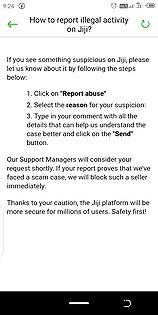Admitting her own lapses, Kenyan job seeker details her experience with a sham interview secured via Jiji; offers advice on how the company could improve its system
Editorial note: As people all over the world face a wide variety of online scams, Thoughtfox decided to converse with a Kenyan job applicant who luckily saved herself earlier this week from an incident of fraud that emerged in connection with the Jiji portal. This conversation gives a glimpse into the circumstances and oversights that lead people into getting scammed; it may thus help readers to avoid some basic pitfalls of online job searches.
To protect her identity, the job applicant’s name has been replaced with fictitious initials KE. While admitting her own errors of judgment leading up to the attempted fraud, KE also offers a useful piece of advice to Jiji (even though her advice would be just as relevant to all online job portals worldwide).
From Thoughtfox, the conversation—conducted through October 26-27, 2022 via Facebook messenger and email—was led by Dr. Piyush Mathur. The transcript has been edited at places for clarity and flow; some post-facto insertions are parenthetical.
Mathur: Ms. KE, you had a rather frustrating, even shocking, experience at a job interview you gave recently in Nairobi. Could you please describe this experience for our readers?
KE: Yeah, true, at an interview I gave a couple of days ago I was asked to pay money to become an employee.
Mathur: This interview was conducted by a firm that (you claim) calls itself 'BC Complex'?
KE: Yes.
Mathur: But you had responded to its advertisement as it appeared on https://jiji.co.ke/, a well-known website in Kenya and several other African countries?
KE: Yeah; I used its android app on my 4-year old smartphone: a Tecno Pouvoir. I don’t have a laptop or desktop.
Mathur: And you are sure that you downloaded the correct app on your smartphone?
KE: Yes. Here is the screenshot of the app on my phone:
Mathur: In the advertisement itself, you saw no indication at all that there was going to be an application fees. Is that correct?
KE: Yeah; no application fee was indicated in the ad.
Mathur: When you reached the interview venue, how many other candidates did you notice waiting for their own interviews for the job?
KE: Two.
Mathur: So, including you, there were 3 candidates at the time?
KE: Yes.
Mathur: What time was it when you reached the venue?
KE: [I reached there] around 10 o’clock in the morning.
Mathur: In other words, scores of other candidates might have followed the three of you?
KE: Yeah.
Mathur: And, of course, the so-called recruiters might be doing this type of thing for a while previously and may continue to do so in the days to come!
KE: True.
Mathur: Was there a panel of interviewers or just one interviewer that you faced?
KE: There was just one interviewer.
Mathur: Was that a man or a woman?
KE: It was a man.
Mathur: Did he mention his name?
KE: Mr Samson was his name.
Mathur: OK. ‘Samson’ was the name he mentioned; but you had no way to crosscheck whether it was actually his name, because you had had no formal correspondence regarding this interview with him. Is that correct?
KE: Yeah.
Mathur: Nevertheless, you did receive, of course, an invitation for the interview. (A screenshot of that invitation is reproduced below.)
This invitation, as we can see, mentions sort of a name— ‘BC, Complex Ltd Com’—but it is not an exact match for what you mentioned in our prior chat with me (and you had typed ‘BC Complex’); also, the four terms (BC, Complex, Ltd, and Com) mentioned in the invitation itself are separated by one comma (which makes no sense linguistically). Moreover, the invitation mentions no responsible official nor the URL of the company.
KE: Yeah.
Mathur: Outside the reference to this claimed company's (dubiously typed) name in this invitation, you had never heard of it. Is that correct?
KE: I had never heard of it.
Mathur: Are you sure that you received this invitation inside the Jiji system?
KE: I got the invitation as a text message, not inside the Jiji system.
Mathur: So, it is quite possible that Jiji does not have ‘Mr Samson’ in their system as a recruiter at all; this person may just be a scammer registered under some other name and who externally texts job seekers listed there to lure them to these sham interviews.
KE: Right. I can’t be sure how he got my number, except that he mentions that I had applied for a job on Jiji.
Mathur: When you received the invitation to the interview, you did not care to check the company's credentials?
KE: I did, but I didn't find their website; thus [I had] no knowledge about it.
Mathur: How, precisely, did you check their credentials? And what did you find about them ahead of deciding to appear for this interview?
KE: I searched the company's name [on the Internet], but the ones that appeared [in my searches] seemed different—in that there were no jobs advertised [on their websites]. So I just wanted to try my luck, [which is] why I decided to go for the interview.
Mathur: Seems like you came upon some information on the Internet that seemed similar to 'BC, Complex Ltd Com' (as the invitation indicates) except that those links had no job advertisements associated with them. Is that correct?
KE: Yeah.
Mathur: Do you recall more than one company whose name seemed to be similar to 'BC, Complex Ltd Com' while you were trying to crosscheck these credentials?
KE: I saw one; others just had the word ‘complex’ in their names…
Mathur: So, you did come across a URL for this one company?
KE: Not exactly—but I saw what it deals with: children with complexities.
Mathur: Is it possible for you to lead us to that exact information as you saw on the Internet?
KE: Yes; here is the screenshot of my search on the Internet:
Mathur: Thank you for that. So, it seems that the two pieces of information—the company's information as represented in the invitation to its interview that you received and this information that you found on the Internet—were not the same. Does that not indicate that the invitation you received might have been an attempt at falsely impersonating an actual company (or pretending to be a company at all through the use of terms such as ‘Ltd’ and ‘Com’)?
KE: Yeah, I can conclude what you suggest above since there was no exact match I found in my searches.
Mathur: Alternatively, it is also possible that you overlooked these inconsistencies between the two pieces of information because you were/are hard-pressed to find a job. You 'just wanted to try my luck' as you put it (in response to one of my prior questions here)?
KE: Yeah.
Mathur: At the same time, it is also true that, in the back of your mind, you depended on the job portal itself. Perhaps you believed that Jiji screens these recruiters before they could put out their calls?
KE: Very true.
Mathur: In short, Jiji may also have its weaknesses as a system—and those hard-pressed for jobs or economic opportunities (and lacking full-on computer-cum-Internet facilities) may get victimised by these weaknesses?
KE: Sure.
Mathur: Let's come back briefly to the interview situation itself. The job advertiser did give you a physical location—and his message containing that information also displayed his phone number at the top. Can you share that screenshot?
KE: Here:
Mathur: And when you reached the venue, you did not see any displays of the company's name or registration?
KE: No, I didn't see any.
Mathur: How much money did this ‘Mr. Samson’ ask you to give him as the application fee?
KE: Ksh 500.
Mathur: Did you have any discussion with him about this—as in, did you ask him why this money was being demanded, and whether the job itself would be a certainty if you deposited this fee?
KE: No, I didn't since I had no money at the time.
Mathur: Was the money demanded at the end of the interview or at the very beginning?
KE: It was demanded at the end of the interview.
Mathur: How long was the interview?
KE: Around 10 minutes.
Mathur: In the interview, did he discuss what the company was about—and what you were going to do within your role if you joined the company?
KE: Yeah, [I was supposed to] market their products, which he promised he would show me after I join the company. I was supposed to work as a sales executive.
Mathur: But he did not specify exactly what type of products?
KE: He said he would explain ‘further’ after [my] joining the company.
Mathur: In other words, you were not only not able to learn anything specific about this alleged company but you were also, by the same token, unable to ascertain for yourself whether it was the same company that you thought you had crosschecked on the Internet?
KE: Sure.
Mathur: Suppose you did have the money that he demanded as the joining fee, would you have given him that amount?
KE: I would have hesitated since I have been conned before. I would have hesitated, yes.
Mathur: Hesitated—but would have ultimately succumbed to the temptation of a new job, and given him that 500?
KE: Yeah.
Mathur: Thanks for being candid. I should think that you saved yourself from a trap owing to the fact that you did not have the money at the time. And yet, you lost many hours in preparing for this interview and journeying to the venue. You also lost a small amount of money that went into your transportation. Are you now convinced that this was a scam that you were lucky enough to have avoided?
KE: Yes, I am greatly convinced that it was a trap that was set for scamming.
Mathur: But you are not readily aware that there is any website or portal—belonging to Kenya's government or Jiji—where you could easily report this particular scam?
KE: I am not. As for Jiji, they tend to ask people to buy a subscription to their premium job ads that are put out by more experienced and reputable employers. Since I have no money, I wouldn't subscribe to this paid alternative.
Mathur: Indeed, it is ironical how Jiji appears to reserve better vetted employers for its paid subscribers. Nevertheless, can you, at the moment, check your Jiji account and see if it has a scam-reporting option in place? Given that the scammer, ‘Mr Samson’, did send you a text message from a number we can see atop his message, maybe you could report that number to Jiji?
KE: I haven't gone through Jiji's system but I can report [the scammer’s number] through their number.
Mathur: Why haven't you gone through the Jiji system in reference to reporting suspicious agents or scams?
KE: Because I fear that scammers are friends with Jiji’s employees, who might retaliate against me for reporting a scammer. As it is I have received lots of random text messages and phone calls just because I responded to some job calls on Jiji. [Here, KE shares several screenshots displaying these random attempts at contacting her; these screenshots are not shared with the readers to protect KE’s identity.]
Mathur: But the technical option to report a scam is provided by Jiji?
KE: I didn’t look into Jiji that deeply because I trusted the app, and I knew they won't fail me; I had a basic knowledge about them when I responded to the job call.
Mathur: Let me insist again: Can you check your Jiji account, and see if they have a scam reporting system?
KE: [After some minutes] I have viewed the app but I don’t see a way to report a scam; however, in my account updates, I see that they have blocked someone…
Mathur: You found no button that could help you report your bad experience with that interview or report that scammer’s number?
KE: No, I found no button.
Mathur: That's very strange. Can you at least call their number you said they have for reporting scams?
KE: Sure I will; I have also found the way to report a scam within the app system. Let me send you the screenshots:
Mathur: Good! You report that number, your experience, now.
KE: OK, I will.
[Around 10 minutes later]
I have contacted them—and they have responded that the same person who was blocked yesterday [had been] using different names, which they noticed..and they had already blocked him. They were glad that I contacted them.
Mathur: Wouldn't you want to credit Jiji now, given that they have blocked that scammer?
KE: Sure, I do give them the credit for acting against the scammer and blocking him already. I am glad that they are so concerned.
Mathur: OK. So, based upon your overall experience now, is there anything you would recommend to Jiji regarding how they might improve their system—so that it be of greater help to (and more secure for) users like you?
KE: I would advise Jiji to give access only to serious employers—to examine them first, go deeper into their adverts to confirm whether they are the right ones—just to avoid such cases in the future.
Mathur: OK. But you also concede that you had not been as careful through this process as you should have been as a job seeker on the Jiji system?
KE: Sure; but I have now learnt to be careful in seeking jobs online.
Mathur: Thank you for coming forward and sharing with Thoughtfox your painful experience. We hope that your interview here would alert others to the pitfalls of using online websites for a job hunt; we also hope that Jiji itself would take the one advice you just gave it toward improving its job portal.
We wish you all the best in your future searches for a suitable job for yourself.
KE: Thank you for having me on this platform.
Dr. Piyush Mathur manages the Facebook group Rich People Help Poor People, which shares economically useful information with its members. If you wish to contact him, please send us a message by clicking here.







